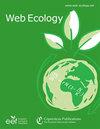树种丰富度、林分结构和生态因素是否影响欧洲森林的光合效率?
IF 2.4
3区 环境科学与生态学
Q2 ECOLOGY
引用次数: 4
摘要
森林树木生活在一个多因素的环境中,包括场地的非生物特征(气候、土壤、基岩)和林分的结构特征(树龄、密度、叶面积指数、树种组成)。在叶和树的水平上分析功能性状(形态、化学和生理,见Bussotti和Pollastrini, 2015),可以评估和评价树木对变化的环境因素的反应。在生理性状中,叶绿素荧光分析(ChlF,即提示荧光和OJIP试验,Strasser et al., 2004)是实验研究中评估植物体内胁迫的有效工具。尽管在局部尺度上进行了一些经验(Koprowski et al., 2015),但由于在森林中很难到达树冠层,因此在大尺度研究中,ChlF在成熟树木上的应用存在更多问题。利用OJIP测试对ChlF进行测量和分析,可以收集大量关于光合作用过程中光利用效率的数据(一次测量需要15秒,并且可以在短时间内进行多次重复)。此外,通过OJIP试验对ChlF诱导曲线进行评价,得到了潜在光合效率的多参数信息。为了评估欧洲森林多样性的功能意义,在7FP项目funddiveeurope(欧洲森林生物多样性的功能意义)中进行了OJIP测试在森林中的大规模应用(Baeten et al., 2013)。在欧洲森林多样性研究平台上,研究了树木多样性对树种光合效率的影响。该平台包括沿纬度梯度(从地中海到北方)分布的6个欧洲成熟森林(单一和混合多达5个物种)。funddiveeurope还包括一个实验平台,由不同树种丰富度水平的混交林组成。这些实验林是在之前的项目实施期间安装的,当时树木还很年轻。这一贡献的目的是:(i)探索ChlF参数沿欧洲生态梯度的变异性;(ii)比较年轻混交林和成熟森林对多样性的响应。为了后者的目的,我们选择了有云杉(Picea abies, L.)的地点。岩溶。(云杉),在实验和探索地点分布最广的树种。在2011 - 2013年夏季,根据各区域树木高度、林分结构和作业条件,采用爬树法、延伸采伐法和射击法进行叶片取样。取样后,将小枝放入密封塑料袋中并加湿以避免叶片脱水。ChlF测量用Handy PEA荧光仪(植物效率分析仪,Hansatech Instruments Ltd, Petney, Norfolk, UK)在每株16片叶子上对样品进行4-5小时的暗适应后完成(仅测量当年针叶的针叶)。为了减少光抑制效应,需要较长的暗适应期。在650 nm、3500 μmol m s的红光脉冲作用下,荧光上升OJIP曲线在对数时间尺度上呈现多相形状。初始荧光水平,用“O”表示,是荧光发射的开始。在“K”时间步长(300 μ s)之后,“J”时间步长(~ 2 ~ 3 ms)和“I”时间步长(~ 30 ms)反映了荧光发射的中间水平。荧光发射的最大水平为“P”(峰值,在500-800 ms-1 s)本文章由计算机程序翻译,如有差异,请以英文原文为准。
Do tree-species richness, stand structure and ecological factors affect the photosynthetic efficiency in European forests?
Forest trees live in a multi-factor environment that includes the abiotic characteristics of the site (climate, soil, bedrock) and the structural features of the forest stand (tree age, density, leaf area index, tree species composition). The analysis of the functional traits (morphological, chemical and physiological, see Bussotti and Pollastrini, 2015) at leaf and tree level allows for the assessment and evaluation of the responses of trees to changing environmental factors. Among the physiological traits, the analysis of the chlorophyll fluorescence (ChlF, namely the prompt fluorescence and OJIP test, Strasser et al., 2004) is an effective tool to assess in vivo plant stress in experimental studies. The application of ChlF on mature trees in large-scale studies is more problematic due to the difficulty to reach tree canopies in forests, although some experiences were carried out at the local scale (Koprowski et al., 2015). ChlF measurements and analyses with the OJIP test allow to collect a great amount of data on the light-use efficiency in photosynthetic processes (one measurement takes 1s and it is possible to make many replications in a short time). Furthermore, the ChlF induction curve, evaluated by means of OJIP test, produces multi-parametric information on the potential photosynthetic efficiency. A large-scale application of OJIP test in forests was carried out within the 7FP project FunDivEUROPE (Functional Significance of Forest Biodiversity in Europe), aimed at assessing the functional significance of forest diversity in Europe (Baeten et al., 2013). The effects of tree diversity on the photosynthetic efficiency of tree species were assessed in the exploratory platform of FunDivEUROPE, that includes six European mature forests (monocultures and mixed up to five species) distributed along a latitudinal gradient (from Mediterranean to boreal). FunDivEUROPE also included an experimental platform, consisting of mixed forest stands planted ad hoc with different levels of tree-species richness. These experimental stands were installed during the implementation of the previous projects when trees were still young. The aims of this contribution are (i) to explore the variability of ChlF parameters along European ecological gradients and (ii) to compare the responses to diversity in young mixed plantations and in mature forests. For the latter purpose, we selected the sites with Picea abies(L.) Karst. (spruce), the most widespread tree species in experimental and exploratory sites. The leaf sampling was carried out in the summers between 2011 and 2013, by means of tree climbers, extension loppers and gun shooters, according to the height of the trees, the stand structure, and the operational conditions in each region. After sampling, branchlets were put in hermetic plastic bags and humidified to avoid leaf dehydration. ChlF measurements were done with a Handy PEA fluorimeter (Plant Efficiency Analyser, Hansatech Instruments Ltd., Petney, Norfolk, UK) after 4–5 h of sample dark adaptation on 16 leaves per plant (in conifers only current year needled were measured). A long dark adaptation period was necessary to reduce the effects of photoinhibition. Fluorescence rise OJIP curves were induced by 1 s pulses of red light (650 nm, 3500 μmol m s). Plotted on a logarithmic time scale, the fluorescence transients show a polyphasic shape. The initial fluorescence level, indicated with “O”, is the beginning of the fluorescence emission. Following the “K” time step (300 μ s), the “J ” (∼ 2 to 3 ms) and “I” time steps (∼30 ms) reflect the intermediate level of the fluorescence emission. The maximum level of the fluorescence emission is “P ” (the peak, at 500–800 ms–1 s). The
求助全文
通过发布文献求助,成功后即可免费获取论文全文。
去求助
来源期刊

Web Ecology
Agricultural and Biological Sciences-Ecology, Evolution, Behavior and Systematics
CiteScore
4.60
自引率
0.00%
发文量
6
审稿时长
17 weeks
期刊介绍:
Web Ecology (WE) is an open-access journal issued by the European Ecological Federation (EEF) representing the ecological societies within Europe and associated members. Its special value is to serve as a publication forum for national ecological societies that do not maintain their own society journal. Web Ecology publishes papers from all fields of ecology without any geographic restriction. It is a forum to communicate results of experimental, theoretical, and descriptive studies of general interest to an international audience. Original contributions, short communications, and reviews on ecological research on all kinds of organisms and ecosystems are welcome as well as papers that express emerging ideas and concepts with a sound scientific background.
 求助内容:
求助内容: 应助结果提醒方式:
应助结果提醒方式:


